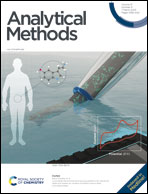An angled-shape tip-based strategy for highly sensitive proteomic profiling of a low number of cells†
Abstract
Profiling proteins plays an essential role in understanding the functions and dynamic networks in biological systems. Mass spectrometry-based proteomic analysis commonly requires multistep sample processing, which results in severe sample loss. Although the recently developed microproteomic strategies have substantially reduced sample loss via droplet microfluidic technology, specialized equipment and well-trained personnel are needed, which may limit their wide adoption. Here, we report an angled-shape tip-based strategy for rapid sample preparation and sensitive proteomic profiling of small cell populations (<1000 cells). The angled-shape tip provided a ‘reactor’ for the entire proteomic sample processing workflow, from cell capture and lysis to protein digestion, eliminating the sample transfer-induced protein loss. The angled-shape tip was surface-treated for anti-protein adsorption which further reduced the sample loss. Using this strategy, 1241 ± 38–4110 ± 37 protein groups and 4010 ± 700–34 879 ± 575 peptides were identified from 10–1000 HeLa cells with high quantification reproducibility in only 4.5 h sample processing time, which was superior to the reported methods and commercial kits, especially for <100 cells. This approach was easily accessible, straightforward to operate, and compatible with flow cytometry-based cell sorting. It showed great potential for in-depth proteomic profiling of rare cells (<1000 cells) in both basic biological research and clinical application.



 Please wait while we load your content...
Please wait while we load your content...